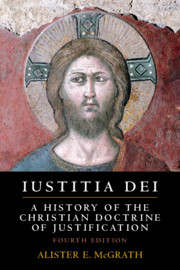Book contents
- Iustitia Dei
- Iustitia Dei
- Copyright page
- Contents
- Tables
- Preface to the Fourth Edition
- Abbreviations
- Introduction
- Part I Justification
- Part II The Middle Ages
- Part III Protestantism
- 11 Is There a ‘Reformation’ Doctrine of Justification?
- 12 Luther’s Early Approach to Justification
- 13 Justification in Lutheranism, 1516–1580
- 14 Reformed Theology, 1519–1560
- 15 The English Reformation
- 16 Protestant Orthodoxy
- 17 Anglicanism
- 18 Puritanism
- 19 Pietism
- Part IV Catholicism
- Part V The Modern Period
- Conclusion
- A Brief Glossary of Medieval Soteriological Terms
- Works Consulted
- Index
12 - Luther’s Early Approach to Justification
from Part III - Protestantism
Published online by Cambridge University Press: 27 January 2020
- Iustitia Dei
- Iustitia Dei
- Copyright page
- Contents
- Tables
- Preface to the Fourth Edition
- Abbreviations
- Introduction
- Part I Justification
- Part II The Middle Ages
- Part III Protestantism
- 11 Is There a ‘Reformation’ Doctrine of Justification?
- 12 Luther’s Early Approach to Justification
- 13 Justification in Lutheranism, 1516–1580
- 14 Reformed Theology, 1519–1560
- 15 The English Reformation
- 16 Protestant Orthodoxy
- 17 Anglicanism
- 18 Puritanism
- 19 Pietism
- Part IV Catholicism
- Part V The Modern Period
- Conclusion
- A Brief Glossary of Medieval Soteriological Terms
- Works Consulted
- Index
Summary
Chapter 12 considers the critically important question of the origins and development of Martin Luther’s distinctive and highly influential views on justification ‘by faith alone (sola fide)’. The chapter presents an analysis of Luther’s reflections on the nature of justification and the question of the meaning of the Pauline term ‘righteousness of God’, identifying the turning points in Luther’s thinking on justification, and its implications for the nascent Protestant movement. It is emphasised that Luther’s changing views on justification were developed in interaction with biblical texts, particularly Paul’s letter to the Romans. Luther initially saw justification as a transformative process, and adopted a generally Augustinian understanding of its dynamics – as seen, for example, in his illustration of a patient being cared for by a physician, who is gradually being restored to health. Luther came to the view that the medieval church had lost sight of the graciousness of justification, and gave an increasingly significant place to the doctrine of justification by faith in his theology – a process which is completed in his assertion that the doctrine was the ‘article by which the church stands or falls’.
- Type
- Chapter
- Information
- Iustitia DeiA History of the Christian Doctrine of Justification, pp. 193 - 203Publisher: Cambridge University PressPrint publication year: 2020

